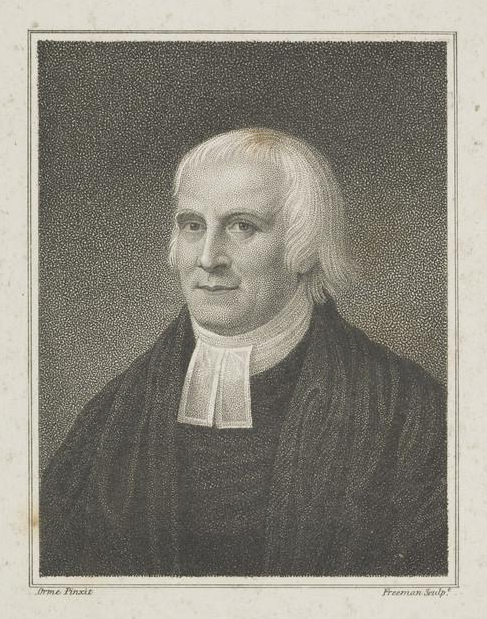David Bogue (1750-1825) is “one of the greatest of the forgotten figures of Church History”, especially in the history of Christian missionary work. He lived at a time when cross-cultural missions from the UK scarcely existed, but his influence and vision, though forgotten, are as great as any other man or woman of that time. I only came across him last week! He deserves more!
Bogue, a Scotsman, was very influential in the birth of the London Missionary Society (LMS). LMS was one of the earliest mission agencies in the UK, the major sending agency before the growth of the China Inland Mission and other such agencies. In March 1792 Bogue preached at the annual meeting in London of the Scottish Society. Bogue urged his hearers to care for the spread of the gospel “among the heathen and ‘mahometan’ (Islamic) nations”. This appeal led to the formation of a missionary society, “irrespective of denomination”. Initially called simply “The Missionary Society”, it was later renamed “The London Missionary Society”.
Bogue dealt forcefully and biblically with ten objections that were raised by Christians at that time. Those ten objections to cross-cultural missions are well worth considering more than 200 years later!
Objection I: The work is impossible. “The work itself is so very arduous, that success cannot be hoped for.”
Objection II: Wrong theology.“The time for the conversion of the heathen has not yet come because the millennium is still at the distance of some hundred years.”
Objection III: The state of the church. “What is there in the state of the Christian church that flatters with peculiar hopes of success for a mission to the ‘heathen’? What makes the time now so favourable? Are we better than our fathers?”
Objection IV: Political opposition. “The governments of the world will oppose the exertions of mission plans and defeat its design.”
Objection VI: Lack of volunteers. “How and where shall we find proper persons to undertake the arduous work of mission to the ‘heathen’?”
Objection VII: Lack of resources. “Where will the missionaries be able to find support?”
Objection VIII: The wrong time for mission. “There is no door open in Providence for the entrance of the Gospel: We should wait until there is and then diligently improve it.”
Objection IX: Failure to believe in the uniqueness of Christ. “What right have we to interfere with the religion of other nations?”
Objection X: The needs of our own country. “We have heathens enough at home. Let us convert them first before we go abroad.”
How many today in 2023 hide behind these same supposed objections and do not obey the Great Commission?
But there was more, much more. Bogue stressed that the missionaries needed training before they went. In 1769 James Cook, the famous explorer, visited Tahiti and said that Christian mission would never take root there. The Anglican, Thomas Haweis, was determined that work there should be undertaken as a priority. It was agreed that the first group of thirty missionaries would go to Tahiti. Haweis and others thought that only a little training was required for those who went on the first two expeditions. They were disasters. With a few notable exceptions, the missionaries failed; many deserted the mission. Some even lost their faith. Only nine out of the sixty remained as mission workers.
That significant missionary failure produced a change of attitude. In August 1800 it was agreed that Bogue should establish the missionary training seminary that he had proposed. As a result of that training, instead of the previous high failure, Bogue’s results were that out of over 200 students, at least 115 were sent out as missionaries to various fields, over half to Africa. It is claimed that there were no more defections, yet the missionaries he trained included some of the early pioneer missionaries.
Among the notable students he taught were the first two Protestant missionaries to China, Robert Morrison and William Milne. Samuel Dyer went to Penang as a missionary with the LMS. Dyer’s daughter Maria later married Hudson Taylor.
Bogue aimed at preparing the future missionaries’ mind and spirit. He created a comprehensive three-year cultural and academic curriculum. But “the instructions must chiefly refer to the heart, and instead of cherishing the desire of shining in the world by distinguished talents, the prospective missionaries must aim at subduing every elating thought, and at mortifying the vain propensities of our nature… Our students are to learn how they may be patient and submissive under disappointments, persevering under long discouragements, ready to meet sufferings or even death, if such should be the divine appointment. The education of a missionary is to prepare him for a work in which he must calculate labour and danger, opposition and reproach”.
Bogue’s pre-field school of missions training was highly significant in the lives of the successful missionaries who went out from his school of mission.
David Bogue. An influential brother indeed.


